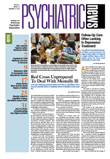Editors of peer-reviewed journals published by APA will require full disclosure of any industry-derived personal income and research funding from all authors of articles they publish, according to an editorial in the September American Journal of Psychiatry (AJP).
Beginning with the October issues, these stricter disclosures will be published at the end of each article, to reveal any such funds received in the 12 months prior to submission, not just for the research covered in the article. The move parallels actions by other medical journals.
“Conflict of interest diminishes the reputation of the field as a whole,” said Robert Freedman, M.D., editor of AJP, in an interview.
“Failures in disclosure are problematic because we believe that pharmaceutical and other industrial support—through speakers' honoraria, consultation fees, and research contracts—may bias the conduct of studies, the interpretation of data, and the reporting of findings,” said the editorial, signed by Freedman, five deputy editors, and the journal's managing editor.
Among those signing the editorial are the editors of Psychiatric Services, Focus, and the Journal of Neuropsychiatry and Clinical Neurosciences, and the chair of the task force overseeing the next edition of the DSM (expected to be published in 2011). Jack McIntyre, M.D., chair of the APA Steering Committee on Practice Guidelines also signed it.
Financial relationships, said a recent statement by the International Committee of Medical Journal Editors, “are the most easily identifiable conflicts of interest and the most likely to undermine the credibility of the journal, authors, and of science itself.”
A study published in the February 1 Journal of the American Medical Association (JAMA) on the risk of relapse in pregnant women who discontinued antidepressant medication was criticized in the lay press, for example, for failing to disclose all relevant industry associations of its authors. JAMA has since strengthened its rules regarding disclosure.
“Change is happening but it is quite slow,” said Sara Schroter, Ph.D., senior researcher at BMJ (British Medical Journal).“ It's surprising that some journals are still not insisting on full disclosure.”
The AJP editors set the boundary for reportable income or support at 12 months, not to veil any prior associations with industry but to allow authors with earlier conflicts to create a new, conflict-free record, said Freedman, professor and chair of the Department of Psychiatry at the University of Colorado Health Sciences Center at Denver.
“Authors' old disclosures are available from previously published articles,” he said “We want to encourage a change in the field, but we don't want to discourage people who have something to say.”
However, an author might still show favor to an industry that provided compensation in the past, said Schroter, a social scientist who studies journal publishing. JAMA's policy now requires detailed financial information covering not only the previous five years but also “for the foreseeable future.”
Journal editors have to face up to other conflict-of-interest questions as well. Only nine of 30 medical journals surveyed by Schroter and colleagues had policies to deal with editors' financial conflicts. Their findings are in the August 31, 2004, Canadian Medical Association Journal.
The editor and deputy editors of AJP disclose all financial information in the first issue of each year and do not work on manuscripts with which they have a conflict, said a statement in the April issue. Reviewers and associate editors must also disclose potential conflicts that could arise in manuscripts they review. Manuscripts submitted by Freedman or his deputy editors are reviewed independently by Howard Goldman, M.D., editor of Psychiatric Services, to avoid any conflicts.
A complete divorce from the pharmaceutical industry is impossible and undesirable, said the AJP statement. However, without clear boundaries, the medical profession is open to criticism from patients about the source of physicians' prescribing decisions.
“For psychopharmaceuticals in particular, the public's perception that medications are prescribed free from industry influence is critical,” said the AJP statement.
If the editors of AJP decide that a conflict of interest exists, they will not publish the submitted paper, said Freedman.
Dropping a conflicted author from the paper is not an option, since publishing rules require that all persons involved in the study must be named. Editors cannot investigate disclosures, given the large number of submissions and co-authors, but if conflicts are discovered after publication, AJP and the other APA journals can publish an “expression of concern,” which remains permanently linked to the article in Medline and other databases. Informing the offending authors' institutions is another possible enforcement tool, said JAMA editor Catherine DeAngelis, M.D., M.P.H. That approach has already triggered internal investigations and expanded conflict-of-interest education at at least three medical schools this year, she said, in an August 23/30 editorial.
